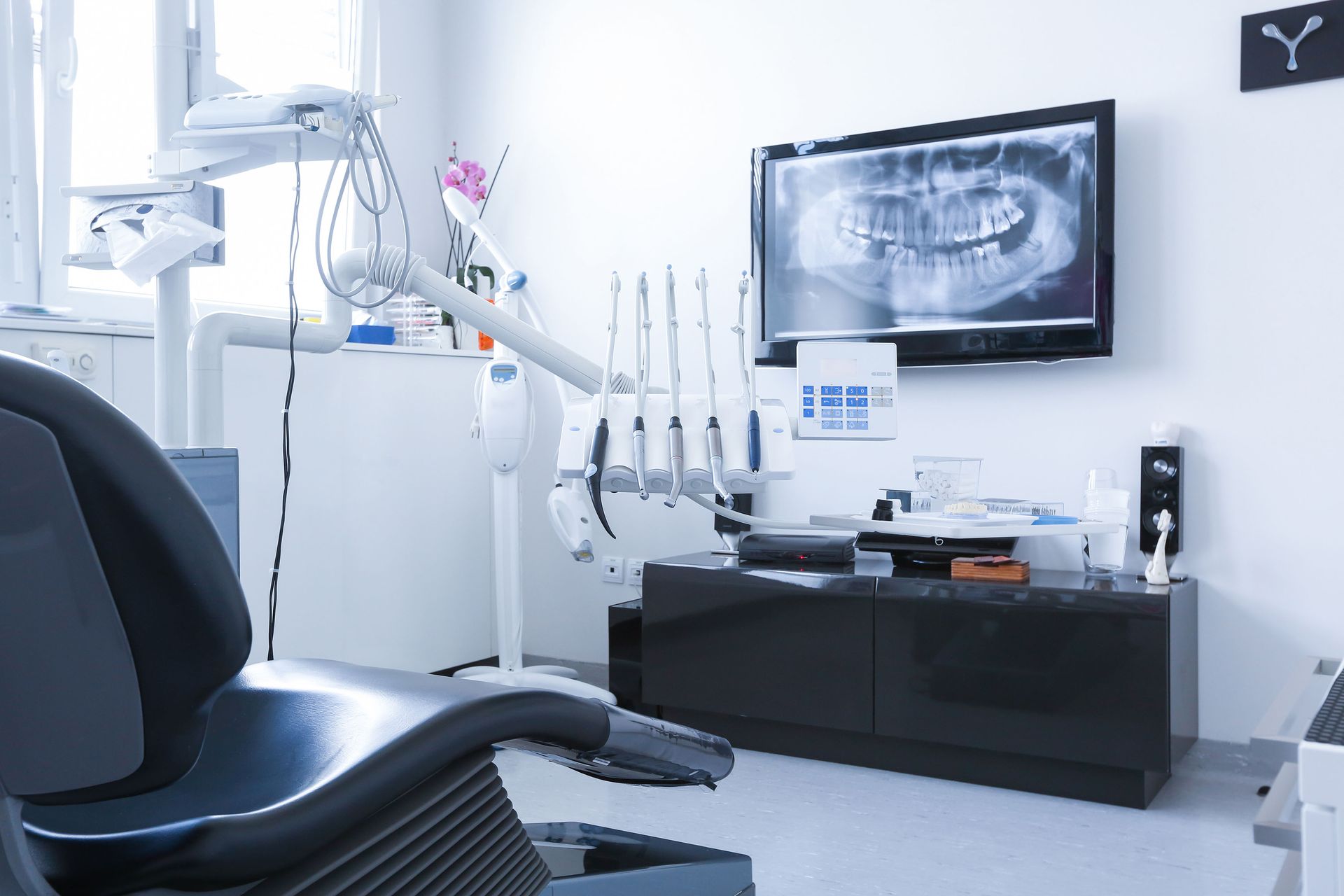September 9, 2025
Are you curious about what you can expect from a modern dental clinic? From state-of-the-art technology to patient-centered care, experienced professionals are combining technology with empathy to provide unparalleled service and care. With the integration of cutting-edge equipment and personalized treatment plans, patients can now expect more comfortable, efficient, and effective dental visits. Let's explore the key components that make up the contemporary dental clinic, ensuring you are prepared for your next visit.
General Anesthesia for Comprehensive Procedures
In certain cases, dental procedures require more than local anesthesia or sedation to be performed safely and comfortably. Modern dental clinics are equipped to provide general anesthesia when treating patients with extensive surgical needs, severe dental anxiety, or medical conditions that make standard treatment approaches difficult. This option allows patients to be completely unconscious during the procedure, ensuring they feel no pain or distress.
Advanced Technology and Equipment
Modern dental clinics have embraced digital radiography, a technology offering significant advantages over traditional film X-rays. Digital X-rays expose patients to significantly lower radiation levels, enhancing safety. The images provided are instantly available for immediate viewing, allowing for quick diagnosis and treatment planning. According to the CDC, 1 in 5 adults (21%) aged 20 to 64 years has at least one untreated cavity, and X-rays may be the most efficient way to find them. Furthermore, digital X-ray images can be easily enhanced and manipulated for detailed analysis. This advancement ensures that dentists can provide more accurate assessments and better care.
Cone beam computed tomography (CBCT), often referred to as a dental CT scan, is another powerful tool now widely used in modern clinics. Unlike standard X-rays, CT scans provide three-dimensional images of teeth, jawbones, and surrounding structures, offering an unparalleled level of detail. This technology is especially valuable for planning dental implants, evaluating impacted teeth, and diagnosing conditions that may not be visible with traditional imaging. By delivering a clear, comprehensive view, CT scans help dentists create precise treatment plans, reduce risks during procedures, and improve long-term outcomes for patients.
Intraoral cameras have become a staple in modern dental diagnostics. These high-resolution devices provide clear images of the inside of the mouth, aiding in the detection of problems that might be missed by the naked eye. Intraoral cameras also aid in patient education, allowing patients to see exactly what the dentist sees. This transparency fosters a better understanding of oral health and necessary treatments. With this tool, communication between the dentist and patient is enhanced, ensuring that treatment plans are fully understood and agreed upon.
Patient-Centered Care Approach
A hallmark of modern dentistry is the focus on personalized care. Dentists are committed to tailoring treatment plans to meet the specific needs and goals of each patient. This individualized approach ensures that all aspects of a patient’s oral health are addressed comprehensively. By taking into account personal history and preferences, the dental team can develop effective and empathetic care strategies. This customization fosters not only better outcomes but also patient satisfaction and trust.
Many people experience anxiety about visiting the dentist, which modern clinics strive to alleviate. Techniques such as sedation dentistry, noise-canceling headphones, and tranquil environments contribute to a relaxing experience. Providing a comfort-focused experience encourages more regular visits, which is crucial for preventive care. Patient feedback is often sought to further enhance comfort and address anxiety triggers. Ultimately, a calm patient is more likely to engage proactively with their dental health.
Effective communication is essential in a patient-centered care model. Dentists must clearly explain diagnoses, treatment options, and potential outcomes to their patients. By doing so, they can ensure that patients are well-informed and can make decisions confidently about their oral health. This transparency is particularly important when considering extensive or costly procedures. When patients understand their options, they are more likely to adhere to treatment plans and engage in their oral health journey.
Infection Control and Safety Standards
Safety is a top priority in modern dental clinics, starting with stringent sterilization protocols. Instruments are meticulously cleaned and sterilized to prevent cross-contamination and infection. This rigorous process is vital, given the intimate nature of dental procedures. Sterilization standards are constantly reviewed and updated according to scientific advancements and regulatory guidelines. By adhering to these protocols, clinics ensure the health and safety of both their staff and patients.
Personal protective equipment (PPE) plays a critical role in maintaining a safe environment within dental clinics. Dentists and their teams wear gloves, masks, and protective eyewear to reduce the risk of pathogen transmission. Patients may also be offered protective bibs and eyewear. The diligent use of PPE is especially important during procedures that generate aerosols. Ensuring that all staff are compliant with PPE usage guidelines is part of committing to patient safety.
Integration of Technology for Enhanced Patient Experience
Digital technology has revolutionized the way patients interact with dental clinics. Online booking systems simplify the appointment process, allowing patients to schedule visits at their convenience. This feature can reduce wait times and increase office efficiency. Patients appreciate the flexibility to choose slots that best fit their busy schedules. In a time when convenience is highly valued, digital booking systems enhance the overall patient experience.
Managing patient records digitally streamlines record-keeping and improves accessibility. Dentists can easily access a patient’s history, facilitating informed and timely care decisions. Moving away from paper files also enhances privacy and data security. Patients benefit from this efficiency, experiencing smoother office visits without cumbersome paperwork. A digital approach to patient records ensures that information is up-to-date and readily available for both routine and emergency care needs.
Training and Expertise of Dental Professionals
Ongoing education is crucial for dental professionals to stay abreast of advancements in the field. Modern clinics ensure that their staff are knowledgeable about the latest techniques, materials, and technologies. This dedication to continuous learning translates to better patient outcomes and innovations in care. Dentists frequently attend workshops and seminars to enhance their skills and expand their expertise. Patients can trust that their healthcare provider is offering cutting-edge treatments informed by the latest research and practices.
Dental professionals often pursue specializations to address various oral health needs in greater depth. By having specialists within the clinic, patients can receive comprehensive care without needing referrals to external providers. This integration of services ensures continuity of care and coordinated treatment plans. Specialization also fosters innovation in approaches to complex dental issues, enhancing treatment effectiveness and patient satisfaction.
The modern dental clinic thrives on a collaborative approach to patient care. Dentists work alongside dental hygienists, assistants, and specialists to provide comprehensive services. This team approach ensures that all aspects of a patient’s oral health are efficiently attended to. By working collaboratively, dental teams can deliver care that meets the high standards of modern dentistry and addresses the specific needs of their patients.
Understanding what to expect at a modern dental clinic can significantly enhance your dental care experience. With advancements in technology, a comprehensive range of services, a focus on patient-centered care, and strict safety standards, today's dental clinics are well-equipped to provide high-quality dental care tailored to individual needs. The integration of technology enhances the convenience, efficiency, and comfort of each visit. By choosing a dental clinic such as Harvey L Shuster DDS that prioritizes these elements, patients can look forward to healthier smiles and a positive dental experience. Give us a call today to get started with a same-day appointment with professionals who have more than 40 years of experience!




